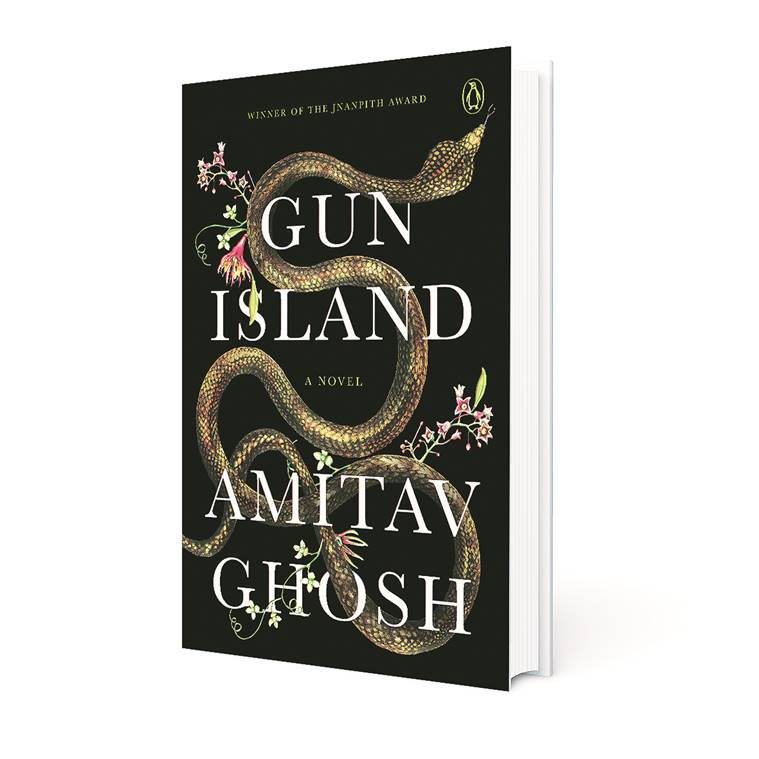
Gun Island
Amitav Ghosh
Penguin/Hamish Hamilton
287 pages
Rs 699
Journeys are essential to an Amitav Ghosh novel. But, as a generation of readers who have grown up on his fiction know, you must discard the old maps on the way — for a fresh, disorienting look at the idea of home and world, nation and borders. I am thinking, of course, of the narrator of The Shadow Lines (1988), poring over an atlas, and tracing the violent, twinned destinies of Khulna (in Bangladesh) and Calcutta through geography as much as history. One might also travel, on the tide of words, as the anthropologist in In An Antique Land (1992) does, discovering through older texts, and the echoes of language, the old linkages between civilisations.
Ghosh’s scholarly, geeky imagination has decentred the postcolonial experience, by illuminating the blind spots of history, by nudging us to see that the implacable walls of the present were once pitstops on the restless routes of human endeavour. By scraping an old, familiar word, he has shown us the ore of history it carries. We enter the puzzling maze of his new novel, Gun Island, holding the thread of one such word — bundook, derived from al-Bunduqqiya, the Arabic word for Venice. It chances upon Deen, the book’s diffident (and often annoyingly earnest) narrator, when he hears of the legend of Bonduki Sadagar and his duel with Ma Manasa, a subaltern goddess of snakes, who represents forces of nature beyond the thrall of human conquest and reason. The novel follows from Ghosh’s urgent belief (articulated in The Great Derangement, 2016) that literature must engage with climate change, as apocalypse is now. But a fiat is often a death-wish for fiction.
Ghosh docks again at the Sundarbans, the mesmeric tide country of one his finest novels, The Hungry Tide. The cast of characters from the 2004 novel are now bit players — Kanai Dutt, the entitled Delhi Bong, is now a news TV regular; Moyna, the young Dalit nurse whose ambition could not accommodate her fey boatman-husband Fokir, is a fretting mother; Piya, the cetologist whose life Fokir died saving, is a benefactor of Moyna and her son. The Sunderbans itself is more ravaged than ever — the islands are slipping away, and cyclones have displaced and blown thousands into squalid cities. For those who remain, life is even more precarious. The fish are scarce, the groundwater poisoned, and vulnerable creatures are either trafficked (women) or surrender silently to death (dolphins). Nilima Bose urges Deen to visit the shrine of Bonduki Sadagar, before the rising waters claim it. Thus is launched this fast-paced, even thrilling narrative, which seems to be driven by the quickening forces of climate doom, but which ultimately chooses velocity over any real tragic vision.

Truly, dear reader, you cannot step into the same waters twice. While The Hungry Tide was a masterly evocation of place — an endlessly elusive, morphing one — Gun Island remains unmoored. It is propelled from Brooklyn to Calcutta to the Sunderbans and, finally, Venice, as it follows the thread of a mysterious legend. Deen’s is the rational, humdrum voice accompanying us on the way. Like the rest of us clinging to rationality in late capitalism, he is befuddled by the invasion of the supernatural in his world, by forces that seem to drive the plot from the margins. Central to this is Moyna’s son Tipu, a wild native of the untamed web, who is transformed by the bite of a cobra into the shadowy sutradhar of this tale. With his friend Rafi, he joins the tide of refugees heaving against the borders of nation-states, and dissolving the map of the world. “The plight of these refugees was indeed similar to that of the indentured workers who had been transported from the Indian subcontinent,” Ghosh writes. While slaves and coolies produced goods for colonial appetites, now the desires of the disenfranchised were the same as that of the rulers. “Rafi, Tipu and their fellow migrants had launched their own journeys… enabled by their own networks…” The systems that had enabled the imperial capitalist project “had now achieved escape velocity: they were no longer under anyone’s control.”
While this is urgent, insistent and contemporary, the journalistic impulse to explain a changing world is not sublimated into the demanding terms of fiction. The novel falters in the thinness of its metaphor and language, which rarely give you occasion to pause, to admire. In The Hungry Tide, Ghosh had created the incantatory rhythm of water through words. One is struck by the number of times the reader is taken along as its characters are found straining their eyes at the landscape. Piya looking through her binoculars or plunging into the occluded waters; Nirmal Bose relating why the tide country resembles a desert (“it can trick the eye with mirages”) — all building up to the sense of human impotence, the limits to what we can see and know. “She had never known the human race to be so faint, so undetectable,” thinks Piya.
By contrast, while Gun Island offers a critique of European project of Enlightenment reason and individualism (also the progenitors of the realist novel), analysing how it narrows human knowledge by divorcing it from nature, it remains just that — an argument. Faced with the apocalyptic dissolution of categories that climate change has brought, can the novelist’s choice of form remain untouched?
In the best of his work, Ghosh’s research, while never invisible, is worn lightly. The sweeping, salty tide of history is felt on the skin of the individual, it comes to ebb in the marshy soil of the human heart, with all its imperfections, deceit and self-delusions. Gun Island suffers because the intellectual hi-jinks — including the solving of a hieroglyph puzzle, a la an erudite Dan Brown — do not make us care much about its people. The narrator, especially, could well be named Dull Deen, whose inelegance of thoughts can thwart the most sympathetic reader. Even a tacked-on romantic subplot does not make him more interesting.
In its last pages, Gun Island turns into an action-packed adventure that ends on the seas with a miracle of nature. There is no pity, nor terror, but an unconvincing, uplifting end. This is a gripping novel, for sure. But from this faithful Amitav Ghosh reader, this is only faint praise.